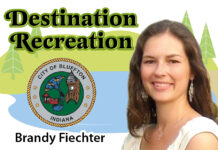By SYDNEY KENT
“Those are the cases we know about,” Jennifer Rohlf, Director of Empowerment with the YWCA of Northeastern Indiana, pointed out. “Many cases of domestic and sexual violence are never reported.”
Rohlf’s sentiment was in response to a statistic: battery cases rose by 52% from 2022-2023 in Wells County. Of the 81 filed cases, over 50 involved domestic violence — this is according to the Wells County Prosecutor’s Office.
Both agencies participate in the county’s Domestic Violence Task Force along with a wide range of providers who interact with the issue. This includes law enforcement, the Department of Child Services, Family Centered Services, counseling services from Park Center and Renovate counseling, the YWCA, Grace and Mercy and more.
Rohlf explained that the goal of the task force is to share information about possible trends that they are seeing, exchange resources, and bring awareness to the issue. In past years, the force has participated in local events such as “A Day in the Life of a Victim”, “Family Safety Day” and an annual candlelight vigil honoring victims that have died as a result of domestic violence.
In 2020, the group shifted from the vigils and instead created a video addressing survivors. In the video, which can be found on YouTube, various members of the task force explain what love should be (safe, trusting and without control) and what love should not be (isolating, hurtful or fearful).
The News-Banner spoke with several members of the task force to learn more about potential resources available to anyone experiencing domestic or sexual violence.
Rohlf said the YWCA provides a “full continuum of care” for survivors. The YWCA shelter, located in Fort Wayne, is accessible 24/7 for anyone fleeing domestic or sexual violence. In her position, she leads a team of advocates who work to provide high-quality services to survivors in a six-county service area.
“The reality is that these things don’t happen during business hours,” Rohlf explained. “They happen at any time of the day. Our emergency shelter can take someone at 3 a.m. on a Saturday if needed.”
However, Rohlf emphasized that the shelter is one small part of the services provided by the organization. She acknowledged that for some survivors in Wells County, the shelter may be an effective way to gain distance from the person they are fleeing, but it may not make sense for everyone.
“We also have advocates that can work one-on-one with people — in the community they live in,” Rohlf said. “Survivors have power in that — they decide what they are comfortable sharing and what they are not. We are there to meet them where they are, to come alongside them in that journey of whatever that next step might be.”
The YWCA has a 24/7 hotline, 1-800-441-4073, for anyone who has or is experiencing domestic and sexual violence to reach out for help.
Rohlf explained that advocates are available to help with a wide range of services, including assisting with filing a protection order, accompanying someone to a sexual assault examination, or listening to them talk about their experience. She emphasized that advocates do not attempt to force survivors to leave the relationship.
“We know the timeline is different for everyone,” Rohlf said. “We are there to meet them wherever they are in this process.”
For survivors who must co-parent with their abuser, the YWCA also offers education on how to co-parent with an abusive partner and how to heal while still interacting with their abuser.
“Just because a relationship ends doesn’t mean the violence ends,” Rohlf said. “We often see partners who continue to stalk or harass their victims, and it might get worse. We see a lot of complex situations, and we have resources to help.”
Domestic violence can have a range of effects on survivors, including depression, post-traumatic stress disorder, anxiety and other mental and physical health issues. The YWCA provides free counseling for survivors of domestic violence — even after the abuse or abusive relationship has ended.
Both staff and residents at Grace and Mercy Transitional Home, located in Bluffton, participate in various training opportunities provided by the YWCA.
Bethanie Burns, a member of the task force and the Program Director at Grace and Mercy, said the training has helped women identify and heal from domestic violence in their lives.
“Not everyone sees the signs,” Burns explained. “Not everyone is being abused physically — but it’s still domestic violence. Sometimes you don’t see the signs when someone is controlling someone else. A lot of times women go through the training, and they realize they were being abused — whether physically, emotionally, or mentally.”
Grace and Mercy provide additional resources for those experiencing domestic violence in Wells County.
“We will speed up the interview process if we have a woman coming from an unsafe place,” Burns said. “We can do phone interviews as well and get them in quickly if we feel we can meet their needs.”
Burns explained that women can be assured they are safe in the locked facility and that their photographs and personal information are never shared publicly.
Counseling services are also available to survivors through Renovate Counseling, according to task force member and counselor Tim Hirschy.
“If someone is going through trauma currently,” Hirschy said, “There is going to be a counselor available. Most have been through trauma-informed care to be able to work with services. We have over 20 counselors available for women who have gone through domestic violence.”
The following resources are available for those facing domestic or sexual violence:
National Coalition Against Domestic Violence Hotline: 1-800-799-7233.
Indiana Coalition Against Domestic Violence: 1-800-332-7385.
YWCA Northeast Indiana: 1-800-441-4073.
Grace and Mercy Transitional Housing: (260) 353-1006.
The Adams Wells Crisis Center: 260-728-9800 or toll-free: 877-728-9800.
sydney@news-banner.com



